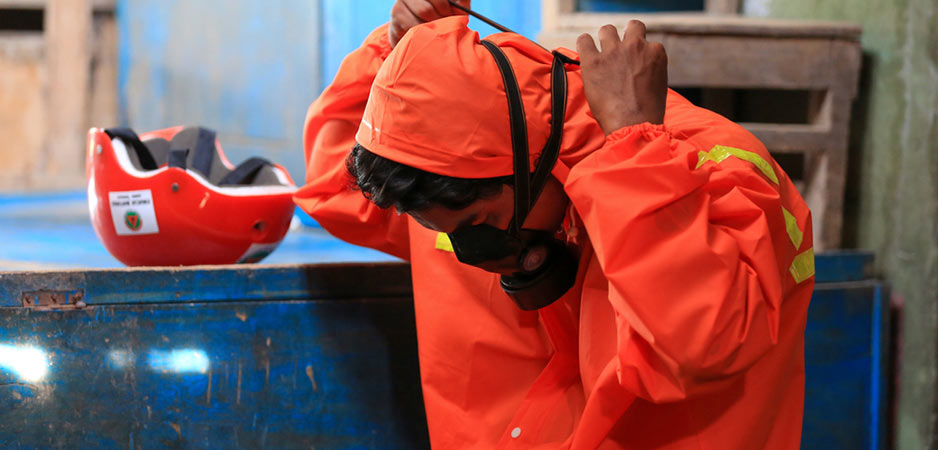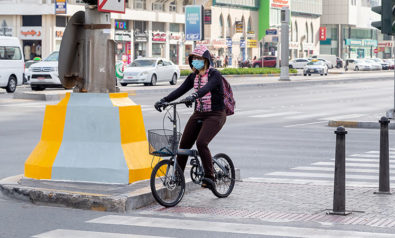At the time of publishing, around 9,800 Indonesians are confirmed to have contracted the novel coronavirus that causes COVID-19. Although the central government had been slow in enforcing self-quarantine measures, the hashtag #dirumahaja (or #WorkFromHome) is trending on social media as more people are staying indoors.
Rohingya Refugee Camps Are the Next Frontline in COVID-19 Fight
Both the public and private sectors, as well as educational institutions, have responded to the pandemic by changing their working styles. While this has involved laying off employees and closing schools, some companies are allowing their staff to work remotely from home and many students are taking classes online.
As a country that has not had any previous experience in developing flexible working hours and telecommuting practices, the coronavirus has taught Indonesia that it can go online. There are many skeptics who still believe that physical attendance equals good performance. Yet the current situation is proof that companies and schools can adapt and utilize modern technology to keep the country moving. The question is whether Indonesia will see a digital revolution to change the way it functions.
To this day, Indonesia as a country still considers that physical attendance and long working hours will improve performance. This is in stark contrast with many developed countries where companies had already introduced flexible working hours and encouraged staff members to work from home, which can cut operating costs. After all, employees who are happy with their job and are better able to manage their work and social lives are more likely to stay at a firm, thus boosting a company’s productivity.
In early February, President Joko Widodo initiated a controversial omnibus bill that aims to improve the ease of doing business and attract investment to Indonesia in order to boost job opportunities and economic growth. The law also allows businesses to increase overtime for employees by up to 18 hours a week and offers provisions for a six-day working week. Not only does the bill show that the government still considers longer working hours to mean added productivity, but it has also led to criticism as it could result in the exploitation of workers.
In addition, at government agencies, work discipline is strict when it comes to attendance and punctuality for the 4.3 million civil servants employed in the public sector. If a worker is late, then they are paid late and miss out on any promotion for the next year. Likewise, if a university lecturer or school teacher is late or fails to attend, they don’t get paid on time.
The Coronavirus Is Changing Things
Concerns about COVID-19 and the involvement of local officials in attempting to prevent the virus from spreading have led to changes in Indonesia, and it’s not only for everyday citizens. Officials from several government ministries, including education, culture and finance, are working from home. Cabinet meetings are even conducted online via videoconferencing.
Startups like Gojek and Tokopedia — a payment system company and an e-commerce firm, respectively — have also applied the same policy. Even the banking industry, which is often strict when it comes to annual leave for its employees, has also urged its staff to work remotely. Rully Setiawan, the corporate secretary of Bank Mandiri, told The Jakarta Post that the health and safety of customers and employees was the priority. He has appealed to people who need financial services to use mobile and internet banking, which is not commonly used by Indonesians.
As with most urban cities, the Indonesian capital, Jakarta, has recorded the highest number of confirmed cases of COVID-19 in the country. The city’s governor, Anies Baswedan, has thus continued to instruct more companies to adopt work-from-home practices. Despite the devasting situation for public health, this policy trend is a breath of fresh air for the world’s 10th most congested city as pollution has dropped.
On March 19, Sambodo Purnomo Yogo, the director-general of the Jakarta Metropolitan Police, said: “More and more private and government offices are implementing work-from-home policies, [which] when viewed from the side of traffic there has been an extraordinary decline.” He revealed that there was a 20% reduction in vehicle volume at the Jakarta toll gate and 18% in the Sudirman-Thamrin protocol line, which has been notorious for traffic jams.
This has, of course, been aided by schools and universities that are currently closed and are holding distance learning classes for this semester. Educational institutions are not only conducting classes online, but they are also holding exams and the defense of university theses.
A Development for Indonesians
This is nothing new for developed countries that have conducted distance learning for years. Yet for a country that does not see the value in learning online, this is a revolutionary development for Indonesia. If such practices continue long after the lockdown is lifted and the spread of the coronavirus has been stopped, digital working and learning could become the new norm in Indonesia.
Not only would this allow staff to balance their work and social lives and also transform the education system, but it could allow people in remote regions of Indonesia to benefit from jobs or programs they could only dream of. Suddenly, people in far-way Indonesian islands could see a wealth of opportunities as they could attend universities or get a job without having to leave home.
Policymakers should be reminded that long work hours and physical attendance do not necessarily mean efficiency. Rather, favorable working practices are more beneficial to all stakeholders in the new digital age. A modern Indonesia has led to new ideas on solutions to long-held issues such as traffic and pollution that the government has for a long time tried to find an answer to.
Of course, the practice of work from home during the current lockdown also has negative implications for various industries, including the tourism sector. In addition, many Indonesians who work as street vendors selling in traditional markets are also at risk of losing money because of this outbreak.
Yet among the uncertainty caused by the coronavirus lies the removal of Indonesia’s skepticism about going online to get things done. Who knew that working and learning remotely is possible and, actually, it’s not a bad idea? There’s a very real possibility that such practices will continue long after the pandemic ends.
The views expressed in this article are the author’s own and do not necessarily reflect Fair Observer’s editorial policy.
Support Fair Observer
We rely on your support for our independence, diversity and quality.
For more than 10 years, Fair Observer has been free, fair and independent. No billionaire owns us, no advertisers control us. We are a reader-supported nonprofit. Unlike many other publications, we keep our content free for readers regardless of where they live or whether they can afford to pay. We have no paywalls and no ads.
In the post-truth era of fake news, echo chambers and filter bubbles, we publish a plurality of perspectives from around the world. Anyone can publish with us, but everyone goes through a rigorous editorial process. So, you get fact-checked, well-reasoned content instead of noise.
We publish 2,500+ voices from 90+ countries. We also conduct education and training programs
on subjects ranging from digital media and journalism to writing and critical thinking. This
doesn’t come cheap. Servers, editors, trainers and web developers cost
money.
Please consider supporting us on a regular basis as a recurring donor or a
sustaining member.
Will you support FO’s journalism?
We rely on your support for our independence, diversity and quality.
































